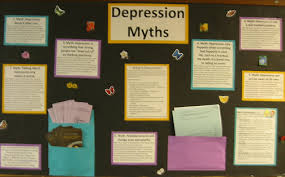There’s still lots of stigma attached to depression. Society, culture, and religion are just some influencers that affect how we treat depression. Lindsay Holmes of the Huffington Post wrote a wonderful article about myths we still hold about mental illness.
Here are 6 myths about depression we still need to break.
Myth 1: Depression is contagious.
Depression is NOT contagious! You don’t catch it from a sneeze or by touching someone. Depression isn’t a germ or virus that you catch. Nor do you catch depression by being in the same room as the person. A 2014 paper published in the journal Memory & Cognition found that people still believe mental illness is communicable from one person to another.
While you can feel low down dealing with someone who is depressed, it’s more that you are affected by the emotions than actually catching some illness. Emotions are known to influence people. But acting like depression is contagious will lead to feelings of isolation for the depressed person.
Myth 2: Depression means violence.
Many people still blame mental illness for horrific tragedies. Just listen to news commentators each time there’s a tragedy. The first question they ask is, “Did the person suffer from mental illness or depression?” If the person was depressed, there’s no pity. The person is judged as crazy or psychotic. Even the words ‘crazy’ and ‘psychotic’ are incorrectly used by reporters either because they don’t know better or it makes a better headline grabber. The belief depression means violence perpetuates a stigma that’s not easy to shed.
But here’s the reality: A mental health disorder does not mean that someone is going to commit a violent act. In fact, a 2014 study found that people with mental health issues are more likely to be victims of violent crimes than the ones committing them.
Myth 3: Depression isn’t common.
The idea that depression is rare or limited to a certain sex or working class is wrong. There’s a lot of people from all walks of life suffering with depression. Approximately one in four people worldwide will experience a mental health issue at some point in their life. That’s about 450 million people! Depression is 4th in global disease and disability. This all makes it very likely that someone you know either suffers or will suffer from depression.
One reason people think depression is rare is because stigma means silence. Someone who’s depressed will remain silent if there’s no sense of support. Often times depression goes unreported. In cases where it affects the poor, there’s little resources to help the person and no accounting is done to include how many poor people suffer from depression.
Myth 4: Depression is “all in your head.”
There’s still the belief in society that someone with anxiety can “just calm down” or someone with depression can “snap out of it.” That’s simply not true. Depression is caused by chemical imbalances within the brain. This is very real and verifiable. Depression and anxiety have very real physical symptoms. Someone who suffers from depression will have changes in appetite, headaches and indigestion. Heart problems increase and there’s an increased risk for heart attack.
Someone who experiences anxiety may endure cardiovascular problems, stomach issues and a weakened immune system. Alopecia (hair loss) is often attributed to anxiety, although that is just a theory. Weakened immune system can lead to infections, prolonged flues and colds, and even influence diabetes. None of these physical conditions are ‘just in your head.’
Myth 5: Depression stems from a bad childhood.
Childhood trauma and bad life situations do affect depression in later life in very negative ways. For instance, alcoholism and abusive behaviour in addition to depression are related to a bad childhood. But other factors also have an influence on mental health disorders.
“It’s not that having a difficult childhood is completely unrelated, but having a difficult childhood can be related to all kinds of things, not just anxiety,” Joseph Bienvenu, an associate professor of psychiatry and behavioural sciences at Johns Hopkins University, previously told HuffPost. “Some people have great childhood and still have anxiety.”
Research suggests that some mental health disorders may be caused by chemical imbalances in the body. Seasonal Affective Disorder, which affects nearly 10 million people at certain points of the year, is about chemical balances changing within the brain. The depression suffered isn’t related to a bad childhood.
Myth 6: You can’t help someone suffering from depression.
Absolutely false! It’s important to reach out and help someone depressed. Depression is treatable. 60% of people with depression can recover with a proper combination of anti-depressants and psychotherapy.
Loved ones are important in helping someone who is depressed get treatment. Social support – family, friends, community – plays a large role when it comes to intervening or preventing suicide. Depression can lead a person to believe the situation is hopeless and life meaningless. Up until the last moment of actually committing a suicidal act, there is hesitation and doubt in the mind of the suicidal person. It is absolutely possible to save someone who wants to kill his/her self by just asking, “Are you planning to kill yourself?”
Family members and friends need to help in a way that’s non-judgmental. Even just helping a person get to appointments, take medications or stick to a daily routine will help the depressed person.
These 6 myths about depression can be broken. It takes the effort and co-operation of family, friends, community, and organizations. There has to be political will to actively work at reducing the number of people suffering from depression in a country. It is possible.
Twitter: @tereziafarkas #depression #anxiety #mentalhealth
*Click here to read more about Terezia Farkas and Depression Help.


